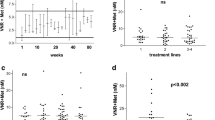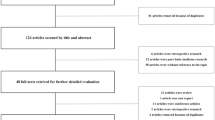Abstract
Purpose
This study investigated correlations of the clinical outcomes of oral metronomic vinorelbine (VNR) with VNR pharmacokinetics and MDR1 polymorphisms.
Methods
Eighty-two patients with metastatic non-small cell lung cancer (NSCLC) unfit for standard chemotherapy were treated with VNR at the oral doses of 20–30 mg every other day or 50 mg three times a week. They had a performance status (PS) ≤ 3, were > 70-year-old and drug-naïve or cisplatin-pretreated. MDR1 2677G > T and 3435C > T polymorphisms were analysed and blood concentrations of VNR and desacetyl-VNR (dVNR: active metabolite) assayed. Overall survival (OS), treatment duration and drug-related toxicity were the main endpoints.
Results
Median OS and treatment duration were 27 weeks (range 1.3–183) and 15 weeks (range 1.3–144), respectively. OS was directly correlated with the duration of VNR treatment and number of therapy lines after VNR treatment (multiple linear regression: adjusted r2 = 0.71; p < 0.00001). Neither MDR1 genotypes nor VNR/dVNR concentrations predicted OS. VNR blood levels were positively correlated with platelet counts (r2 = 0.12; p = 0.0036). Patients who had long-term benefit (treated for ≥ 6 month without toxicity) showed lower VNR concentrations than those who had not. Twelve patients stopped therapy due to grade 3–4 toxicity. Toxicity was associated with blood concentrations of VNR ≥ 1.57 ng/mL and dVNR ≥ 3.04 ng/mL, but not with MDR1 polymorphisms.
Conclusions
Neither pharmacokinetic nor pharmacogenetic monitoring seem useful to predict OS. On the other hand, high VNR and dVNR blood levels were associated with severe toxicity.




Similar content being viewed by others
References
Kareva I (2017) A combination of immune checkpoint inhibition with metronomic chemotherapy as a way of targeting therapy-resistant cancer cells. Int J Mol Sci 18:E2134. https://doi.org/10.3390/ijms18102134
Cazzaniga ME, Camerini A, Addeo R, Nolè F, Munzone E, Collovà E, Del Conte A, Mencoboni M, Papaldo P, Pasini F, Saracchini S, Bocci G (2016) Metronomic oral vinorelbine in advanced breast cancer and non-small-cell lung cancer: current status and future development. Future Oncol 12:373–387. https://doi.org/10.2217/fon.15.306
Bocci G, Kerbel SR (2016) Pharmacokinetics of metronomic chemotherapy: a neglected but crucial aspect. Nat Rev Clin Oncol 13:659–673. https://doi.org/10.1038/nrclinonc.2016.64
Biziota E, Briasoulis E, Mavroeidis L, Marselos M, Harris AL, Pappas P (2016) Cellular and molecular effects of metronomic vinorelbine and 4-O-deacetylvinorelbine on human umbilical vein endothelial cells. Anticancer Drugs 27:216–224. https://doi.org/10.1097/CAD.0000000000000319
Kontopodis E, Hatzidaki D, Varthalitis I, Kentepozidis N, Giassas S, Pantazopoulos N, Vardakis N, Rovithi M, Georgoulias V, Agelaki S (2013) A phase II study of metronomic oral vinorelbine administered in the second line and beyond in non-small cell lung cancer (NSCLC): a phase II study of the Hellenic Oncology Research Group. J Chemother 25:49–55. https://doi.org/10.1179/1973947812Y.0000000050
Camerini A, Puccetti C, Donati S, Valsuani C, Petrella MC, Tartarelli G, Puccinelli P, Amoroso D (2015) Metronomic oral vinorelbine as first-line treatment in elderly patients with advanced non-small cell lung cancer: results of a phase II trial (MOVE trial). BMC Cancer 15:359. https://doi.org/10.1186/s12885-015-1354-2
Mencoboni M, Filiberti RA, Taveggia P, Del Corso L, Del Conte A, Covesnon MG, Puccetti C, Donati S, Auriati L, Amoroso D, Camerini A (2017) Safety of first-line chemotherapy with metronomic single-agent oral vinorelbine in elderly patients with NSCLC. Anticancer Res 37:3189–3194
Guetz S, Tufman A, von Pawel J, Rittmeyer A, Borgmeier A, Ferré P, Edlich B, Huber RM (2017) Metronomic treatment of advanced non-small-cell lung cancer with daily oral vinorelbine—a Phase I trial. Onco Targets Ther 10:1081–1089. https://doi.org/10.2147/OTT.S122106.eCollection 2017
Briasoulis E, Pappas P, Puozzo C, Tolis C, Fountzilas G, Dafni U, Marselos M, Pavlidis N (2009) Dose-ranging study of metronomic oral vinorelbine in patients with advanced refractory cancer. Clin Cancer Res 15:6454–6461. https://doi.org/10.1158/1078-0432.CCR-09-0970
Briasoulis E, Aravantinos G, Kouvatseas G, Pappas P, Biziota E, Sainis I, Makatsoris T, Varthalitis I, Xanthakis I, Vassias A, Klouvas G, Boukovinas I, Fountzilas G, Syrigos KN, Kalofonos H, Samantas E (2013) Dose selection trial of metronomic oral vinorelbine monotherapy in patients with metastatic cancer: a hellenic cooperative oncology group clinical translational study. BMC Cancer 13:263. https://doi.org/10.1186/1471-2407-13-263
Di Desidero T, Derosa L, Galli L, Orlandi P, Fontana A, Fioravanti A, Marconcini R, Giorgi M, Campi B, Saba A, Lucchesi S, Felipetto R, Danesi R, Francia G, Allegrini G, Falcone A, Bocci G (2016) Clinical, pharmacodynamic and pharmacokinetic results of a prospective phase II study on oral metronomic vinorelbine and dexamethasone in castration-resistant prostate cancer patients. Invest New Drugs 34:760–770
Wong M, Balleine RL, Blair EY, McLachlan AJ, Ackland SP, Garg MB, Evans S, Farlow D, Collins M, Rivory LP, Hoskins JM, Mann GJ, Clarke CL, Gurney H (2006) Predictors of vinorelbine pharmacokinetics and pharmacodynamics in patients with cancer. J Clin Oncol 24:2448–2455
Wong M, Evans S, Rivory LP, Hoskins JM, Mann GJ, Farlow D, Clarke CL, Balleine RL, Gurney H. Hepatic technetium Tc 99 m-labeled sestamibi elimination rate and ABCB1 (MDR1)genotype as indicators of ABCB1 (P-glycoprotein) activity in patients with cancer (2005). Clin Pharmacol Ther 77:33–42
Vivona D, Lima LT, Rodrigues AC, Bueno CT, Alcantara GK, Barros LS, DE Moraes Hungria VT, Chiattone CS, Chauffaille MDLLF, Guerra-Shinohara EM, (2014) ABCB1 haplotypes are associated with P-gp activity and affect a major molecular response in chronic myeloid leukemia patients treated with a standard dose of imatinib. Oncol Lett 7:1313–1319
Pan JH, Han JX, Wu JM, Sheng LJ, Huang HN, Yu QZ (2008) MDR1 single nucleotide polymorphisms predict response to vinorelbine-based chemotherapy in patients with non-small cell lung cancer. Resiration 75:380–385
Viñolas N, Provencio M, Reguart N, Cardenal F, Alberola V, Sánchez-Torres JM, Barón FJ, Cobo M, Maestu I, Moreno I, Mesía C, Izquierdo A, Felip E, López-Brea M, Márquez A, Sánchez-Ronco M, Tarón M, Santarpia MC, Rosell R, Spanish Lung Cancer Group (2011) Single nucleotide polymorphisms in MDR1 gen correlates with outcome in advanced non-small-cell lung cancer patients treated with cisplatin plus vinorelbine. Lung Cancer 71:191–198. https://doi.org/10.1016/j.lungcan.2010.05.005
The Elderly Lung Cancer Vinorelbine Italian Study group (1999) Effects of vinorelbine on quality of life and survival of elderly patients with advanced non-small cell lung cancer. J Natl Cancer Inst 91:66–72
Marty M, Fumoleau P, Adenis A, Rousseau Y, Merrouche Y, Robinet G, Senac I, Puozzo C (2001) Oral vinorelbine pharmacokinetics and absolute bioavailability study in patients with solid tumors. Ann Oncol 12:1643–1649
Gauvin A, Pinguet F, Culine S, Astre C, Gomeni R, Bressolle F (2000) Bayesian estimate of vinorelbine pharmacokinetic parameters in elderly patients with advanced metastatic cancer. Clin Cancer Res 6:2690–2695
Gauvin A, Pinguet F, Culine S, Astre C, Cupissol D, Bressolle F (2002) Blood and plasma pharmacokinetics of vinorelbine in elderly patients with advanced metastatic cancer. Cancer Chemother Pharmacol 49:48–56
Bugat R, Variol P, Roché H, Fumoleau P, Robinet G, Senac I (2002) The effects of food on the pharmacokinetic profile of oral vinorelbine. Cancer Chemother Pharmacol 50:285–290
Nguyen L, Tranchand B, Puozzo C, Variol P (2002) Population pharmacokinetics model and limited sampling strategy for intravenous vinorelbine derived from phase I clinical trials. Br J Clin Pharmacol 53:459–468
Variol P, Nguyen L, Tranchand B, Puozzo C (2002) A simultaneous oral/intravenous population pharmacokinetic model for vinorelbine. Eur J Clin Pharmacol 58:467–476
Urien S, Brée F, Breillout F, Bastian G, Krikorian A, Tillement JP (1993) Vinorelbine high-affinity binding to human platelets and lymphocytes: distribution in human blood. Cancer Chemother Pharmacol 3:231–234
Lê LH, Moore MJ, Siu LL, Oza AM, MacLean M, Fisher B, Chaudhary A, de Alwis DP, Slapak C, Seymour L (2005) Phase I study of the multidrug resistance inhibitor zosuquidar administered in combination with vinorelbine in patients with advanced solid tumours. Cancer Chemother Pharmacol 56:154–160
Funding
This study was funded by Lega Italiana Per la Lotta contro i Tumori, LILT-sezione di Rovigo.
Author information
Authors and Affiliations
Corresponding author
Ethics declarations
Conflict of interest
All Authors declares that they have no conflict of interest.
Ethical approval
All procedures performed in this study involving human participants were in accordance with the ethical standards of the institutional and/or national research committee and with the 1964 Helsinki declaration and its later amendments or comparable ethical standards.
Informed consent
Informed consent was obtained from all individual participants included in the study.
Rights and permissions
About this article
Cite this article
Gusella, M., Pasini, F., Caruso, D. et al. Clinical outcomes of oral metronomic vinorelbine in advanced non-small cell lung cancer: correlations with pharmacokinetics and MDR1 polymorphisms. Cancer Chemother Pharmacol 83, 493–500 (2019). https://doi.org/10.1007/s00280-018-3751-0
Received:
Accepted:
Published:
Issue Date:
DOI: https://doi.org/10.1007/s00280-018-3751-0




